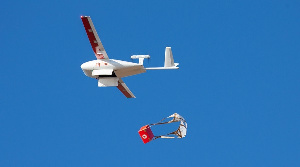 Zipline drone takes off from nest to deliver supplies
Zipline drone takes off from nest to deliver supplies
The Ghana Health Service (GHS) has commended Zipline for its impact on healthcare delivery across the country through its timely and innovative instant delivery services via drones to about 2,421 health facilities.
Since its introduction in 2019, Zipline’s innovative instant delivery services have made over 12 million deliveries comprising medical commodities, routine vaccines, COVID-19 samples and vaccines, and blood products – fortifying Ghana’s position as hub of the world’s largest drone medical delivery service.
The work of Zipline from April 2019 to date includes delivering some 8.63 million lifesaving medical products or medicines, about 1.9 million child immunisation vaccine consumables, and over 1.4 million COVID-19 vaccines and PPEs.
It has also made about 10,000 deliveries of blood products across the country.
Investigations of some health facilities by the B&FT in some parts of the country revealed a high level of excitement among healthcare providers who have one way or another benefitted from Zipline’s innovative instant delivery services.
The Adaklu District Director of Ghana Health Services, Charles Kofi Azagba, noted that prior to introduction of the Zipline delivery services, the Adaklu district was faced with a problem of timely medical supplies delivery, especially in emergency situations.
“We have been using the services of Zipline for the past 6 months. Before the introduction of Zipline, we went through a lot of difficulties in getting medical and non-medical supplies to various health facilities in the district,” the Director said.
“However, with the coming of Zipline we rarely run out of stock; or when we run out of stock we easily get to restock our facilities from Zipline. For instance, before Zipline it was difficult to get medical supplies such as anti-snake and anti-rabies serum; but with Zipline, once the order is made we get the medical supplies in about 30 minutes,” he added.
A Senior Laboratory Technician at the Akatsi District Hospital, Kenneth Owusu Agyemang, described the hospital’s experience with Zipline’s medical drone delivery services as a very novel intervention that ensures timely medical supplies to the health facilities.
“The impact of Zipline services has been that of a good intervention; because without some of the products from Zipline, which have always been timely, we can’t attend to the clients (patients) with what we need to treat them. The problem is that we don’t always have supplies in stock because of some impediments. So, by using Zipline services the supplies come in time to help us,” he said.
Citing some instances of lifesaving situations at the hospital, Mr. Owusu Agyemang said the lives of many patients were saved by the multiple units of blood delivered through Zipline’s timely response by drone delivery.
“There was an emergency case in our maternity ward, when a pregnant woman came in with ectopic pregnancy for which the doctors needed more blood supplies for the patient. We had only one unit of blood available and so had to call Zipline for more. We received three drone deliveries of blood, which helped in saving the woman’s life,” he said.
“Another instance was when a man who came in with a serious anaemic case around at 10pm, and the Zipline hub at Anum where we source our products from was ready to attend to our emergency call, although it was outside their work period. This made it possible for us to save the life of that man,” he added.
Since establishing itself in Ghana during 2019, Zipline Ghana has expanded from one distribution hub to six hubs in remote areas of the country, making Ghana home to the world’s largest fleet of medical-delivery drones. Zipline delivers up to four pounds (1.8kg) of medical commodities to remote clinics and hospitals within an 80-kilometre radius from each distribution hub within minutes.
Commenting on the impact of instant delivery operations in Ghana, General Manager for Zipline Ghana, Mawuli Atiemo, indicated that their data and responses from health facilities point out that the innovative medical drone delivery services to the health sector have been enormously effective.
“The impact is enormous; we cannot overestimate the impact this is having on the country’s health sector. That is why more and more countries are adopting our innovative drone delivery services. If our work in Ghana and Rwanda were not positive, Japan, Nigeria, Kenya and some states in the US wouldn’t have signed up for similar services,” he said.
The General Manager commended the government of Ghana for its partnership and support in helping transform healthcare delivery in Ghana.
Mr. Atiemo hinted that discussions are underway to pilot the delivery of other use cases in Ghana, “just as we currently deliver swine semen and other products in Rwanda”.
